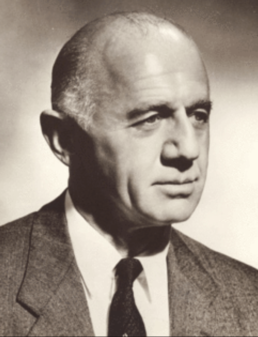These life stories may contain descriptions of childhood trauma and abuse, as well as images, voices and names of people now deceased. If you need help, you can find contact details for some relevant support services on our support page.
20th Prime Minister of Australia, William McMahon (1908-1988), was in kinship care as a child.
William Daniel McMahon was born in Sydney to Mary Ellen and William Daniel McMahon, both Australian born. William senior was a lawyer and son of an Irish migrant, James McMahon, who had built up his own freight company in Sydney.
By the time William was three years old, the McMahon family had grown to four children, William senior was doing well in his legal practice, but Mary Ellen was suffering from tuberculosis. Given the fear of infection, William senior sent his children to be cared for elsewhere.
James, William, Sam, and Agnes were split up and juggled between their aunts and uncles, grandparents, and cousins. They would change home as their relatives needed, always subject to the whims and desires of their elders. On occasion, siblings would end up in the same house — but it was never permanent. It was always ad hoc (Mullins).
The iterant home life of the children can be summed up in William McMahon’s later observation that he “would need a full half-hour to list them all” (Mullins).
Mary Ellen died when William was nine. He had seen her so little, if at all during the previous six years that “she had always been a ghost” to him (Mullins).
The four children were permanently separated, with William going to stay with his maternal uncle and aunt, Samuel and Elsie Walder. The Walder’s had always provided William with emotional support, so it is easy to imagine he was happy there.
But when he was thirteen, William was sent to board at Abbotsholme College in Killara before transferring to Sydney Grammar School in 1923.
“I couldn’t say it was an unhappy childhood,” William said later. “That would be wrong.” But it was a lonely childhood. Isolated from his siblings, kept from his father, moving from school to school, he learned to rely on himself, to follow his own desires, to do what he wanted. It led to a very firm belief in the virtue of going in his own direction, always on his own: “I received very little guidance as to what I should or should not do. You had to make your own way” (Mullins).
Biographer Patrick Mullins disputes that the young William received “little guidance” citing many an instance of Samuel Walder’s influence.
William went on to study law at the University of Sydney, and he was later articled to Allen, Allen & Hemsley. McMahon was a partner in the firm from 1939 to 1941.
During WWII, McMahon served first in the citizen Military Forces and later in the Australian Imperial Force. He was discharged in 1943 because of health problems. At the end of the war McMahon returned to the University of Sydney to study economics.
William McMahon was first elected to the federal parliament in 1949. He held the seat of Lowe in Sydney (since abolished) for 33 years and served as Prime Minister from 1971 to 1972.
References:
Leeser, Julian. “McMahon, Sir William (Billy) (1908-1988).” Australian Dictionary of Biography, vol. 18 (2012). https://adb.anu.edu.au/biography/mcmahon-sir-william-billy-15043
Mullins, Patrick. Tiberius with a telephone: the life and stories of William McMahon. Brunswick, Vic: Scribe Publications, 2018.
“William McMahon.” Australia’s Prime Ministers. National Archives of Australia. https://www.naa.gov.au/explore-collection/australias-prime-ministers
Image available here.
